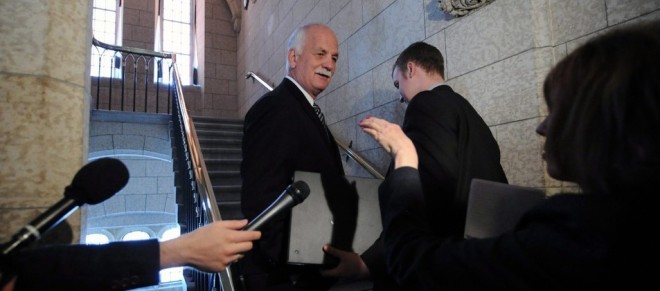Vikileaks: a bad way to make a good point
Canada has learned a lot more about Vic Toews than it needed to
Minister of Public safety Vic Toews comments on the verdict in the Shafia trial as he makes his way threw the Foyer of the House of Commons on Parliament Hill in Ottawa on Monday, January 30, 2012. THE CANADIAN PRESS/Sean Kilpatrick
Share
 “Vic wants to know about you. Let’s get to know about Vic”
“Vic wants to know about you. Let’s get to know about Vic”
Thus begins the Vikileaks Twitter account, a mean-spirited, vindictive, and very effective effort to humiliate and discredit Public Safety Minister Vic Toews. The account claims to draw its material from publicly available court documents from Toews’s divorce. In less than 100 tweets (so far), its anonymous author assassinates Toews’ character in ways personal and professional. I learned more about Toews than I cared to.
I won’t pass along the dirt. I don’t have to. It’s out there for anyone to read—and a lot of people are reading. As I write, the account has been active for about 48 hours, and it already has over 7,000 followers. Even if the account is shut down, its revelations will live online forever. And it probably won’t be shut down. Publishing court records is perfectly legal.
Does that make it right? I don’t think so. As opposed as I am to the Lawful Access bill (excuse me, the “Protecting Children from Internet Predators Act“) and as appalled as I am by Toews’ disgusting assertion that those who disagree with him stand with pedophiles, I still think it’s indecent and just plain mean to drag the guy’s personal business onto the Internet, just to make a point.
But who cares what I think? It’s on the Internet, whether or not Vic and I like it. There used to be a time when journalists like me would sit around with our editors agonizing over whether or not we should run information like the this. We would weigh the newsworthiness of the story against the harm it would cause, and if we deemed the balance to be off, we would keep the dirt hidden, maybe forever. No more.
These days, the decision to spread information isn’t being made solely by journalists. It’s being made by technologists, too. If data is collected and connected, it will be leaked. Even if it’s wrong to leak it, it will be leaked. Even if only the police are supposed to know it, it will be leaked.
Point taken.
Jesse Brown is the host of TVO.org’s Search Engine podcast. He is on Twitter @jessebrown